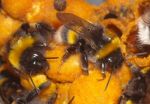(Press-News.org) Boston—Practices used in policing injection drug users in Russia might contribute to HIV transmission and overdose mortality.
A study, conducted by researchers from Boston University Schools of Medicine and Public Health, in collaboration with St. Petersburg Pavlov State University, sought to discover the effect police arrests had on the health outcomes of a cohort of HIV-positive people with lifetime of injection drug use.
Those who were arrested by police were more likely to share needles—increasing HIV transmission—and to overdose, according to the study published in the Journal of the International AIDS Society. Their research also found no indication that police arrests reduce drug use.
"We already know that addressing individual risk behaviors is important in reducing HIV transmission among people who use drugs, who are most at risk for HIV infection," said lead author Karsten Lunze, MD, MPH, DrPH, a BUSM assistant professor of medicine. "Our study adds that drug laws and policies, and the way they are enforced, are also important to prevent the spread of HIV."
By linking the impact of police tactics with health outcomes of injection drug users, the researchers identified the need to create prevention programs for modifying individual behaviors and to address policing practices as part of the HIV risk environment.
"Instead of arresting people who use drugs, there should be more of a focus on facilitating access to treatment," said Jeffrey Samet, MD, MA, MPH, a professor of medicine and community health sciences at BUSM and BUSPH who also led the study. "Public health and public safety working together can help address the increasing problem of HIV among people who use drugs."
Further research needs to relate these findings to the operational environment of law enforcement and to understand how police interventions among injection drug users can improve, rather than worsen, the HIV risk environment, the researchers said.
INFORMATION: END
BU researchers relate arrests with HIV risk environment
2014-07-09
ELSE PRESS RELEASES FROM THIS DATE:
Miriam Hospital study examines effect of depressed mood on pulmonary rehab completion
2014-07-09
PROVIDENCE, R.I. -- Researchers from The Miriam Hospital have found that people with Chronic obstructive pulmonary disease (COPD) who are also depressed have difficulty sticking to a pulmonary rehabilitation program. This appears to be particularly true for women, and screening and brief treatment of depression should be considered as part of treatment. The study and its findings are published in print in Respiratory Medicine.
Chronic obstructive pulmonary disease is a common and often disabling inflammatory lung disease characterized by a progressive airway obstruction ...
Bee foraging chronically impaired by pesticide exposure: Study
2014-07-09
A study co-authored by a University of Guelph scientist that involved fitting bumblebees with tiny radio frequency tags shows long-term exposure to a neonicotinoid pesticide hampers bees' ability to forage for pollen.
The research by Nigel Raine, a professor in Guelph's School of Environmental Sciences, and Richard Gill of Imperial College London was published July 9 in the British Ecological Society's journal Functional Ecology.
The study shows how long-term pesticide exposure affects individual bees' day-to-day behaviour, including pollen collection and which flowers ...
Adults with special needs see gains, challenges with long term oral care
2014-07-09
BOSTON (July 9, 2014) — A retrospective study conducted by researchers at Tufts University School of Dental Medicine and colleagues reports that among adults with intellectual and developmental disabilities, the likelihood of having cavities decreased as the number of years receiving dental care increased. The findings, published in the July/August issue of Special Care in Dentistry, may help improve interventions designed to address the oral health of individuals in this population.
The researchers reviewed the dental records of 107 patients at one of the eight clinics ...
Most prescription labels fail to meet guidelines, risking dosage errors
2014-07-09
Small print and poor printing on prescription labels handed out by pharmacists may be misread and may lead to errors in taking medication, according to new research by the University of Waterloo and CNIB (Canadian National Institute for the Blind).
The study, published recently in the Canadian Pharmacists Journal, found that labels on prescription medications dispensed by pharmacies do not consistently follow professionally recommended guidelines for legibility.
By simply following recommended guidelines for font size, use of bolding, justification, sentence case and ...
Penn study finds living kidney donation does not increase risk of death or heart disease for older
2014-07-09
PHILADELPHIA – Previous studies linking older age with kidney and heart disease have raised concerns about the safety of living kidney donation among older adults. However, in the first study to look closely at this issue, researchers at the Perelman School of Medicine at the University of Pennsylvania report that older kidney donors (55 years and above) enjoy similar life expectancy and cardiovascular health as very healthy older people who did not donate their kidneys. In light of the ever increasing organ transplant waitlists, the authors of the study hope the results ...
Projecting a 3-dimensional future
2014-07-09
Since the 1960s, theatergoers have shelled out for crude 3-D glasses, polarized glasses, and shutter glasses to enhance their viewing experience. These basic devices, used to trick the brain into perceiving an artificial three-dimensional reality, may soon be rendered obsolete with the introduction of new holography technology developed by Tel Aviv University researchers.
TAU doctoral students Yuval Yifat, Michal Eitan, and Zeev Iluz have developed highly efficient holography based on nanoantennas that could be used for security as well as medical and recreational purposes. ...
Shark teeth analysis provides detailed new look at Arctic climate change
2014-07-09
A new study shows that some shark species may be able to cope with the rising salinity of Arctic waters that may come with rising temperatures.
The Arctic today is best known for its tundra and polar bear population, but it wasn't always like that. Roughly 53 to 38 million years ago during what is known as the Eocene epoch, the Arctic was more similar to a huge temperate forest with brackish water, home to a variety of animal life, including ancestors of tapirs, hippo-like creatures, crocodiles and giant tortoises. Much of what is known about the region during this period ...
Making a more healthful, low-fat hot dog without giving up texture
2014-07-09
With grilling season upon us, many backyard cooks are turning to more healthful alternatives to their savored but fatty hot dogs. But low fat can sometimes mean low satisfaction. Now researchers are reporting new progress toward addressing the texture problem in low-fat wieners that are made with olive oil rather than pork fat. Their study was published in ACS' Journal of Agricultural and Food Chemistry.
Ana M. Herrero and colleagues note that hot-dog consumers have come to expect just the right amount of chewiness and springiness, among other things, from their beloved ...
Tiny DNA pyramids enter bacteria easily -- and deliver a deadly payload
2014-07-09
Bacterial infections usually announce themselves with pain and fever but often can be defeated with antibiotics — and then there are those that are sneaky and hard to beat. Now, scientists have built a new weapon against such pathogens in the form of tiny DNA pyramids. Published in the journal ACS Applied Materials & Interfaces, their study found the nanopyramids can flag bacteria and kill more of them than medicine alone.
David Leong, Jianping Xie and colleagues note that some infectious pathogens can lie in wait, undetectable in the human body or in places that antibiotics ...
My brother's keeper
2014-07-09
This news release is available in French.
Montreal, July 9, 2014 — Whether it's how to throw a ball or put together a puzzle, young children learn a lot from their older siblings. While researchers have long known that brothers and sisters teach each other about the world, most of their observations about this have been made in a lab setting.
A new study recently published in the Journal of Cognition and Development by Concordia University education professor Nina Howe takes that investigation a step further by observing how children interact in their natural habitat: ...

